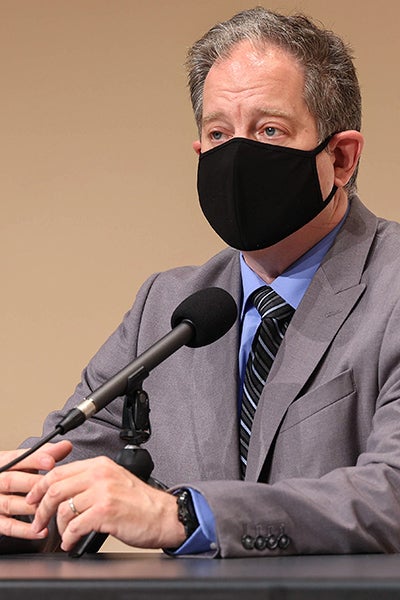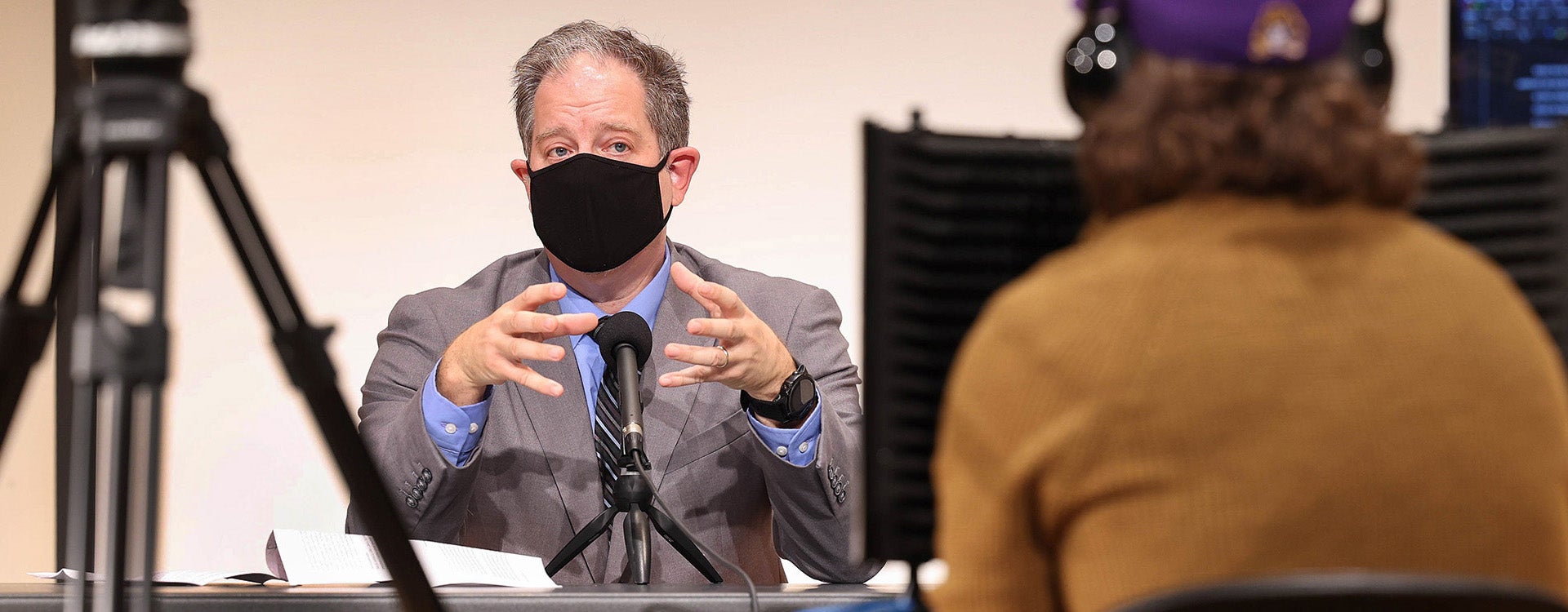Emergency medicine professor earns national award in medical toxicology
A Brody School of Medicine emergency medicine professor has received a national award for his work in medical toxicology research.
Dr. Jason Hack, vice chair for research and chief of the Division of Medical Toxicology in the Department of Emergency Medicine was awarded the Outstanding Contribution to Medical Toxicology Research award by the American College of Medical Toxicology (ACMT).

Dr. Jason Hack, vice chair for research and the new chief of the Division of Medical Technology in the Department of Emergency Medicine, was awarded the Outstanding Contribution to Medical Toxicology Research award by the American College of Medical Toxicology. (Photo by Rhett Butler)
WANT MORE?
Find out more about Dr. Hack’s work with poisonous plants and animals with ECU’s podcast Talk Like a Pirate. In Season 3, Episode 5 of Talk Like A Pirate, the ECU Brody School of Medicine emergency medicine physician talks about the abundance of snake bites in eastern North Carolina, as well as the beauty and dangers of flowers.
The award is designated to individuals who demonstrate outstanding contributions to the areas of basic or clinical science research, research contributions that have changed the practice of medical toxicology, and research innovation.
Founded in 1993, ACMT is a professional, nonprofit association of physicians with recognized expertise in medical toxicology. The group was organized in 1993 as the primary organization to serve physicians who are medical toxicologists. This practice includes caring for patients with drug overdose, acute drug abuse problems, chemical exposures and envenomations.
As part of Brody’s faculty for 10 years as associate-chief of the Division of Medical Toxicology and then as associate professor, Hack earned awards for teaching, mentoring and scholarly productivity before leaving for Brown University, where he was promoted to full professor.
Hack returned to Brody in 2020 as vice chair for research and chief of the Division of Medical Toxicology in the Department of Emergency Medicine. His main research interests are developing clinical tools to improve patient care and assisting in decision-making, device invention and manufacturing and analysis and clarification of medical practices.
Hack said the award from the ACMT is a career highlight because it represents a nod from other experts in his field.
“To be recognized for this by a group of medical toxicologists who have reviewed my body of work and feel that it’s worthy of national recognition? I’m thrilled,” he said. “Honestly, I can’t believe it that I joined the ranks of a list of people in my mind who are exceptional researchers. I’m over the moon.”
Hack’s work — and the resulting inventions — have real-world implications.
He researched, invented and developed a first-aid tool for victims of poisonous snake bites after recognizing that available devices were not adequate for treating snake bites on the body anywhere other than the hands or feet.
“I saw this as an opportunity to save lives and set out to create something that would give victims time to get from the field to a hospital for definitive care,” he said. “I developed a device to make a ‘moat’ of compressed tissue circumferentially around the bite site, to hold the venom in that area and stop it from spreading to other parts of the body.”
East Carolina University recognized the life-saving utility of the device, financed the U.S. patent and marketed the device. The device is now available under the name Venom LoccTM.
“There has already been one case that I am aware of in which Venom Locc potentially saved a life by providing the time to get a snake bite victim to the hospital before the spread of venom from the bite site,” Hack said.
His work also focuses on assessing alcohol-induced impairment through the creation of standardized protocols and tools, which led to his invention of Hack’s Impairment Index (the HII Score), which provides a way to measure the degree of alcohol impairment in patients in the emergency department. The HII Score has become a standard of care for the objective evaluation of alcohol impaired patients at Rhode Island Hospital and has been initiated in major institutions across the nation including Texas, Michigan, Iowa and Florida. It is also being used by Kaiser of Southern California as a screening tool for psychiatric patients and in sobering centers in Louisiana. Hack received a $70,000 grant from Risk Management at Lifespan Inc. who recognized the utility of the HII Score tool so it can be developed into an app for use in Epic.
He was nominated for the award by Dr. William Meggs, professor and executive vice chair of faculty, research and toxicology in Brody’s Department of Emergency Medicine. Hack worked with Meggs running the toxicology consult service and the toxicology educational program for the emergency medicine residency.
Hack said the recognition from the group will hopefully leverage the field of medical toxicology and Brody’s exploration of the area.
“As the vice chair for research for the Department of Emergency Medicine, I am looking at expanding the number of innovative research projects that the department is involved in,” he said. “I am working hard to get us involved in national research networks. I am working hard to begin an affiliation with N.C. Poison Control, because I think that is an area ripe for research.”
In acknowledging the award, Hack paused to acknowledge his beginnings as a researcher, discovery and answer-seeker.
“I have to give credit to my parents for supporting and allowing me to explore crazy ideas I had growing up, and I don’t think I ever lost that,” he said. “I pay attention to the world around me, and when I see something that isn’t right, or I think I can do better or it just hadn’t been explored at all, that’s something that attracts me.”

Hack discusses venomous snakes in North Carolina during ECU’s Talk Like A Pirate podcast.